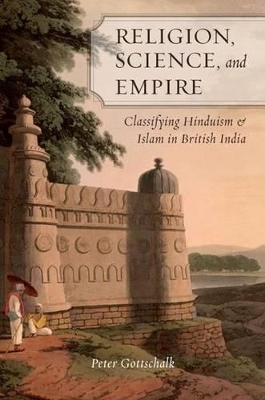
Religion, Science, and Empire
Oxford University Press Inc (Verlag)
978-0-19-539301-9 (ISBN)
England's ascent to power coincided with the rise of empirical science as an authoritative way of knowing not only the natural world, but the human one as well. The British scientific passion for classification, combined with the Christian impulse to differentiate people according to religion, led to a designation of Indians as either Hindu or Muslim according to rigidly defined criteria that paralleled classification in botanical and zoological taxonomies.
Through an historical and ethnographic study of the north Indian village of Chainpur, Gottschalk shows that the Britons' presumed categories did not necessarily reflect the Indians' concepts of their own identities, though many Indians came to embrace this scientism and gradually accepted the categories the British instituted through projects like the Census of India, the Archaeological Survey of India, and the India Museum. Today's propogators of Hindu-Muslim violence often cite scientistic formulations of difference that descend directly from the categories introduced by imperial Britain.
Religion, Science, and Empire will be a valuable resource to anyone interested in the colonial and postcolonial history of religion in India.
Professor and Chair, Department of Religion, Wesleyan University.
Acknowledgements ; List of Illustrations ; Glossaries ; Note on Transliteration ; Foreword by Peter Lake ; Introduction ; Chapter One: Religion, Science, and Scientism ; Chapter Two: Cartography, the Ideal of Science, and the Place of Religion ; First Interlude: The Dynamics of Comparison and Classification ; Chapter Three: Christocentric Travel Writing: Dynamics of Comparison and Classification ; Second Interlude: The Five Modes of Comparison ; Chapter Four: Humanist Travel Writing: Ascent of Empiricism and the On the Spot ; Third Interlude: Classification in the Natural Sciences ; Chapter Five: Categories to Count On: Religion and Caste in the Census ; Chapter Six: A Raja, a Ghost, and a Tribe: Studies in Ethnology, Folklore, and Religion ; Chapter Seven: Popularizing Chainpur's Past: Archaeology in Place and in Museums ; Chapter Eight: Chainpur Today ; Conclusion ; Appendices ; Notes ; Index
| Erscheint lt. Verlag | 20.12.2012 |
|---|---|
| Zusatzinfo | 18 black and white halftones |
| Verlagsort | New York |
| Sprache | englisch |
| Maße | 236 x 157 mm |
| Gewicht | 703 g |
| Themenwelt | Geschichte ► Teilgebiete der Geschichte ► Religionsgeschichte |
| Geschichte ► Teilgebiete der Geschichte ► Wirtschaftsgeschichte | |
| Geisteswissenschaften ► Religion / Theologie ► Hinduismus | |
| Geisteswissenschaften ► Religion / Theologie ► Islam | |
| Sozialwissenschaften ► Soziologie | |
| ISBN-10 | 0-19-539301-5 / 0195393015 |
| ISBN-13 | 978-0-19-539301-9 / 9780195393019 |
| Zustand | Neuware |
| Informationen gemäß Produktsicherheitsverordnung (GPSR) | |
| Haben Sie eine Frage zum Produkt? |
aus dem Bereich


